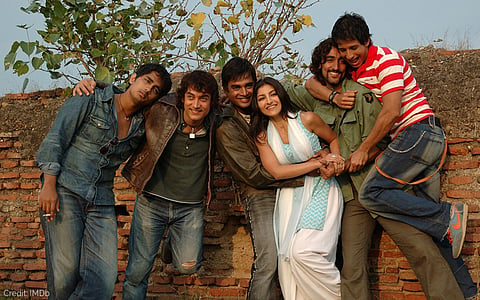
- Reviews
- Power List 2024
- Cannes 2024
- In-Depth Stories
- Web Stories
- News
- FC Lists
- Interviews
- Features
- FC SpecialsFC Specials

When I reflect on the three years I spent in pursuit of a bachelor's degree, I always come back to the same thought—I learnt more outside the classroom than in it. The one movie that aptly portrays this sentiment is Rang De Basanti. The film follows the lives of a bunch of Delhi University students but doesn't feature a single classroom scene that shows the students attending a lecture.
College opens you up to new worlds. While your schoolmates were likely from a socioeconomic milieu that strongly resembles your own, college introduces you to a range of people whose family backgrounds are entirely different from yours. The students in Rang De Basanti are an apt representation of this. They hail from different tiers of society and follow different religions; there is one uber-rich guy who doesn't seem to have a purpose in life; there is one creative guy who mooches off said rich guy; there are those who spend their entire time on campus embroiled in moral policing thinly disguised as campus politics.
The gang is also a perfect example of how opposites attract in friend groups. DJ and Sukhi are the jokesters; they crack everyone up during scene rehearsals for Sue's documentary. Aslam is the philosopher poet with a hint of mischief. Karan is the sensitive brooder who pretends to not care about anything. Sonia is the voice of reason. What unites them is their love for a good time with good company. So much so that when Sue asks Aslam if he studies at the university too, he responds with this being the first time that the 'padhai wala ilzaam' has been thrown at them, i.e., the first time they have been 'accused' of studying.
The varying points of view that a group like this brings to the table is shown in several scenes. The entry of the foreigner Sue into their lives and the occasional presence of a Flight Lieutenant in their midst makes the friends ponder over the relevance of patriotism in twenty-first century India. The gang's standoff with student politicians reveals their divergent attitudes towards partying and merrymaking on campus. The contrast is subtly displayed by having Aslam tell Lakshman to stay away from these events if he detests them. They are both teetotallers who do not flirt with members of the opposite sex. But while Lakshman barges into the campus parties menacingly, Aslam happily participates in them, painting graffiti instead of drinking and laughing at his friends' pathetic womanising efforts without judgement.
The scene where DJ and Sukhi ogle at models on TV is also worth talking about because it neither glorifies nor shames them for doing so. Male college students in the 2000s were not the most politically correct people, and the act of rating women from one to ten based solely on looks seems like something someone you knew from that time would have done too. That scene is simply art imitating life without commenting on it.
It has been fifteen years since Rang De Basanti came out, and it remains a popular favourite to this day because the core issues it addresses still feel relevant. The funny moments are still hilarious, and the sad moments still evoke tears. For me, its depiction of college life as a realistic portrayal instead of a lecture (pun intended) makes it that much more special.